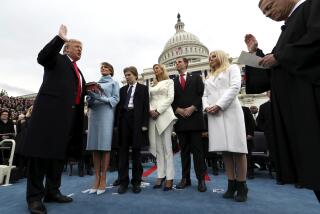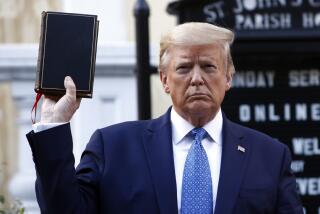God or Mammon
- Share via
A U.S. senator is putting a new and troubling spin on the question: “What would Jesus drive?” Sen. Charles E. Grassley (R-Iowa), who is pressing tax-exempt churches to be more open about their finances, told The Times that “Jesus came into the city of Jerusalem on a donkey.” Given that example, Grassley asked, “Do these ministers really need Bentleys and Rolls-Royces to spread the Gospel?”
Actually, they do, according to a politician who attends a Georgia church that has attracted the attention of the Senate Finance Committee, on which Grassley is the ranking Republican. “It’s important,” state Rep. Randal Mangham told Times staff writer Jenny Jarvie, “for kids to see you don’t have to sell drugs to drive a nice car.”
You don’t have to accept that rationale for putting the preacher behind the wheel of a Bentley to take the larger point: Government should tread carefully in trying to decide what constitutes a legitimate religious expenditure. Because they enjoy tax-exempt status, churches and other religious organizations rightly owe the Internal Revenue Service an accounting of their finances to guard against fraud and profiteering. But regulators -- and members of Congress -- shouldn’t impose their own theological notions on America’s dizzyingly diverse religious culture.
Grassley’s inquiry into the financial practices of so-called mega-churches poses the potential for upsetting the delicate balance between regulation and harassment. The senator has asked six churches to hand over records of salaries, expense accounts, credit cards, cars and airplanes. Some of the expenses he queried are indeed eyebrow raising, such as a $23,000 “commode with a marble top” at Joyce Meyer Ministries in Fenton, Mo. (Shades of the Pentagon’s $600 toilet seat, an extravagance the frugality-minded Grassley railed against more than a decade ago.)
No doubt the Finance Committee could spend all of its time enumerating what some of its members would consider frivolous or extravagant expenditures by churches. But while such an inquiry might make for entertaining television, it also could put Congress in the position of passing judgment on religious matters.
When Jesus advised his fellow Jews to “render unto Caesar the things which are Caesar’s, and unto God the things that are God’s,” he didn’t provide a detailed description of which were which. The IRS similarly has struggled with how to hold churches accountable without trespassing on religious freedom. The result is a defensible double standard under which churches have to certify that compensation for ministers is reasonable but don’t have to file the same detailed paperwork about salaries required of other nonprofits.
As the IRS itself describes the situation: “Congress has enacted special tax laws applicable to churches, religious organizations and ministers in recognition of their unique status in American society and of their rights guaranteed by the 1st Amendment of the Constitution of the United States.” To believers in the strictest possible separation of church and state, this preferred position for religious nonprofits is heresy. But it has a long pedigree in American law.
The 1st Amendment guarantees the “free exercise” of religion; it doesn’t provide a similar protection for other charitable activities. For that reason, both Congress and the Supreme Court often have allowed Americans to do things for religious purposes that wouldn’t be permissible otherwise. The rationale is that believers shouldn’t be forced to act contrary to their faith unless there is a “compelling state interest.” That principle explains laws allowing for the use of peyote in Native American religious rites and exemptions from the military draft for religious conscientious objectors.
The belief that a clergyman should drive a luxury car -- or wear a jeweled bishop’s miter, for that matter -- might seem absurd or even un-Christian to some members of Congress and their constituents. But judgments about religion are notoriously subjective, which is why the IRS proceeds carefully in investigating allegations that churches have abused their tax-exempt status. Congress should display a similar caution.
More to Read
Get the L.A. Times Politics newsletter
Deeply reported insights into legislation, politics and policy from Sacramento, Washington and beyond. In your inbox twice per week.
You may occasionally receive promotional content from the Los Angeles Times.










